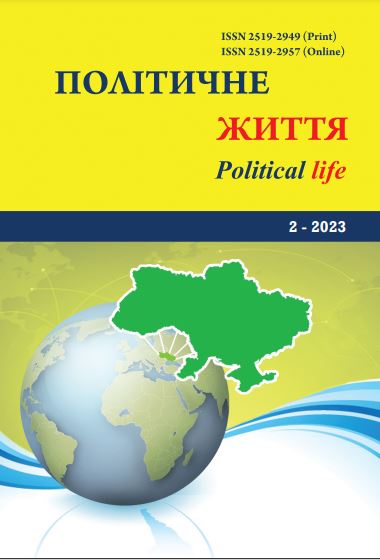Key indicators of information warfare Russia against Ukraine
DOI:
https://doi.org/10.31558/2519-2949.2023.2.10Keywords:
information warfare; fakes; trolls; memes; messages; narratives; desinformation; propagandaAbstract
The work is devoted to revealing the essence and key indicators of information warfare in the conditions of modern armed aggression of Russia against Ukraine. The concept of "information war" and the structure of such derivatives as: fakes, trolls, memes, messages, narratives, disinformation, propaganda are analyzed.
Purpose of the information warfare is clarified – is to loosen up moral and material forces of the enemy or opponent and to enhance their own that provides propaganda influence activities on the man conscience in ideological and emotional spheres. It is mentioned that destruction which is caused by information conflicts in social psychology, individual psychology, is equal by the scale and sense but sometimes is higher than consequences of armed wars.
Information war is considered as a qualitatively new type of warfare, one of the most dangerous types of weapons, active countermeasures in the information space, which includes: collection of tactical information; guaranteeing the security of one’s own information resources, spreading propaganda or disinformation to demoralize the enemy’s army and population; undermining the quality of the enemy’s information and preventing the enemy’s ability to gather information.
It is noted that in order to effectively counter the information war, it is necessary to regularly take countermeasures. Mass media, state institutions with a clearly defined level of responsibility of each individual executive body for ensuring information security play a major role in solving this task.
References
Zhukovskaya, D. Joseph Goebbels – media theorist of the Third Reich. URL: http://www.historicus.ru/joseho_Gebbels_teretik_SMI_Tretyego_Reiha/
Semyon, N.F. (2018). Russian Internet resources as a factor in the information war against Ukraine (on the example of the Pravda.Ru and Russian Dialogue websites). Dis. K. social. j. International University of Economics and Humanities named after acad. S. Demyanchuk. Smooth. 260 p. [in Ukrainian].
Molander, Roger C. Strategic information warfare: in the new side of war / Roger C. Molander, Andrew S. Riddile, Peter A. Wilson. URL: http://www.rand.org/pubs/monograph_reposts/MR661.html
Pocheptsov, G.G. (2001). Information and disinformation. Kyiv: Nika-Center, 256 p. [in Ukrainian].
Lizanchuk, V.V. Anti-Ukrainian information aggression in the television and radio space of Russia and Ukraine. Scientific notes of the Institute of Journalism. URL: http://nbuv.gov.ua/UJRN/Nzizh_2014_56_5 [in Ukrainian].
Libiki, M. What is the information war? URL: http://viysko.com.ua/texnologiji-voyen/martin-libiki-shho-take-informacijna-vijna/
Barna, O. S. (2019). Information space of Ukraine as a factor of social consolidation in conditions of hybrid war. State and law. Legal and political sciences. No. 86, р. 365-376.
Information warfare is not only about fakes. URL: https://ms.detector.media/propaganda-ta-vplivi/post/29264/2022-03-31-informatsiyna-viyna-tse-ne-tilky-feyky/
Media under martial law. Recommendations of the Commission on journalistic ethics regarding information that cannot be disclosed. Media Detector: Website. URL: https://detector.media/infospace/article/197627/2022-03-17-zmi-v-umovakh-voiennogo-stanu-rekomendatsii-komisii-z-zhurnalistskoi-etyky-shchodo-informatsii-yaku-ne-mozhna-rozgholoshuvaty/.
Dilai, A. (2019). War for Ukraine: from information operations to direct invasion. Visn. Lviv. university Series: Journalism. No. 45, р. 13-20.
Batrymenko, O.V. (2022). The role of social media in the Russian-Ukrainian information war. Political science bulletin: a collection of scientific papers. Kyiv: Vadex LLC, Issue 89, р. 124-132. [in Ukrainian].
Russia tripled its propaganda spending during the war with Ukraine, media reports.URL: https://focus.ua/world/512231-rossiya-vtroe-uvelichila-rashody-na-propagandu-vo-vremya-voyny-s-ukrainoy-smi
Rethinking Ukraine’s de-occupation policy within the framework of Russia’s hybrid war against Ukraine. (2020). Analytical report. Kyiv: International Renaissance Foundation, 178 p.
Kresina, I.O. (2018). Peculiarities of the use of information technologies by the aggressor country in hybrid warfare. State and law. Series: Political sciences. No. 81, р. 27-41. [in Ukrainian].
About the Strategy for the Development of the Information Society in the Russian Federation for 2017-2030. Decree of the President of the Russian Federation dated May 9, 2017 No. 203. URL: http://kremlin.ru/acts/bank/41919
Magda, E.V. (2015). Hybrid warfare: survive and win. Kharkiv: Vivat, 304 p. [in Ukrainian].

